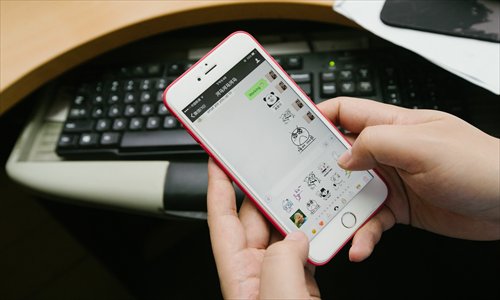Master users school foreigners on how to use pics and gifs on Chinese social media platforms
One of Will August's favorite things in life is receiving a good sticker from a friend. A 25-year-old video blogger who is active and popular on Chinese social networking platforms, including Twitter-like Sina Weibo and bilibili.com, a Chinese video website famous for real-time commenting, August takes pride in keeping his sticker collection up-to-date.
"It's a form of expression that text alone cannot achieve," he said. "I think nowadays it's a better way to express a feeling. If you are trying to be a bit sarcastic, you can show it by adding a sticker."
A step up from emoji, the little smiley faces and other ideograms, stickers are small digital illustrations or artwork that users can buy or create to send through messaging apps and social networking platforms like WeChat, Sina Weibo and QQ.
While the stickers are hot among Chinese users, they have been slow in catching on in the foreign community. But there are still some foreigners who excel at the fine art of stickers. So Metropolitan has interviewed several "sticker masters" to guide you through the exciting new world of stickers.

Experienced sticker users recommend that expats join WeChat groups that share trendy stickers. Photo: Li Hao/GT
New social etiquette
August can't remember exactly when he fell for the charm of stickers, but he remembers receiving his first sticker from a friend on WeChat and saying to himself, "Cool! How do I do that?"
From there, August started to use stickers in all his conversations, collecting the ones he liked from friends as he went along. He gradually built up an impressive sticker collection and is now known as a "master in the art" among his peers. He said many of his friends would sometimes ask him to share his stickers with them "to replenish their collection."
For August and his friends, stickers elevate conversation. "When you are purely chatting through text, sometimes you are not sure what the other person is feeling. You can't hear the intonation behind the text," August said.
He added that stickers are also good for downplaying bad news. "If you decline someone (an invitation) and add a 'good hentai' (meaning pervert in Japanese, the word hentai is often used to refer to animated pornography) sticker after it, [the receiver] can't really be mad," he said.
For him, using stickers is never meant as a insult. Instead, they are a way of lightening the mood. He said that "If people are unpleasant with stickers, they are probably equally unpleasant without!"
Being able to stand out with his stickers is very important to August. He doesn't usually use the packs (a packaged collection) of stickers available for downloading on WeChat because "you have to pay for them" and, more importantly, "they get unfashionable fairly quickly." A lot of the stickers he uses are from his friends and online followers.
He adds new stickers to his collection whenever he sees something hilarious and constantly edits his stock to stay on point.
"My current favorite is the 'Doge' face," he said. The Doge is an Internet meme that has been popular since 2013 that features an astonished Shiba Inu dog that looks as if it is having an internal monologue.
He also likes stickers of celebrities. One of his most frequently used celebrity stickers are of Jim Carrey, a comedian and actor who has quite exaggerated facial expressions. August also enjoys editing his own photos and gifs into stickers and often uses them in his Sina Weibo and WeChat conversations.

As China's sticker culture flourishes, many expats find themselves lost when trying to communicate with their Chinese friends. Photo: Li Hao/GT
Chinese versus Western stickers
August is fluent in both English and Chinese and converses on social media in both languages. He said there are quite a few differences in how Chinese speakers use stickers compared to their English-speaking, Western counterparts. One reason for this he said is China's superiority in social application add-on development.
"I would say that China is way ahead in stickers," said August. "In the West, the selections of stickers is limited."
He considers WeChat very innovative and a great influence on the sticker culture, as it has allowed the use of custom stickers, many of which later went viral. He also noted differences between the major platforms. For example, to him, Facebook is more of a social app than an instant messenger, whereas WeChat is the opposite. It focuses more on the chat aspect, which provides space for the sticker culture to grow.
Another important factor he said is cultural differences. "In China, being cute is cool, it's mengmengda (adorable). In the West, it's seen as immature, so stickers are also seen as fairly immature," he said. He added that the perspective is slowly changing among many foreigners in China but said the association of cute and silly with immaturity is still there for most.
During the Spring Festival holidays and Lantern Festival on Monday, Leanne Wang, 26, came to realize that her foreign friends love to use festival or celebration-themed stickers, which she finds quite basic.
She also noticed that her expat friends usually don't have as large a collection as her Chinese friends. However, when it comes to people who are not into the ACG (anime, comics, and games) culture, she found that both Chinese and foreigners equally lag behind.
"They use a small number of stickers, many of which are downloaded [from sticker shops]," she said.
Concluding that "it's not a matter of nationalities, it's a matter of whether they are into ACG," Wang rarely uses stickers that are too dirty (explicit) or have too many Chinese characters when she converses with expats.
Rising sticker culture among expats
In local fashion brand Plastered T-Shirts' chat group, when somebody says the day's sales figure is good, Dominic Johnson-Hill sends a sticker of somebody jumping in the air and waving their arms instead of saying "Well done."
Johnson-Hill, a Briton and founder of the brand, has lived in China for more than two decades. He finds that China has a much stronger sticker culture than many other countries.
He partly attributes the popularity of stickers in China to the fact that Chinese tend to be more shy about expressing their feelings. He said for the Chinese, stickers are "a fun and playful way to let someone know your feeling," while the British might want to have a more direct answer and don't feel a sticker is enough.
"Chinese people are very deep into this culture, and they instantly recognize the stickers as an old one, a naive one, or one from three months ago," he said. "They'll spend money and have a whole wealth of stickers, and they know how to use different types: which ones are popular, which ones give them faith, which ones are beautiful, new or fashionable."
He doesn't know many foreigners who are as invested in the culture as the Chinese. "We just send a cute little sticker that we consider fun. We don't know how to communicate with them yet. For us, it's still something new, and it's almost awkward or rather silly."
It was Johnson-Hill's children, all of whom were born in China, who introduced stickers to him. "They would say, 'Daddy that's such an old sticker,' or 'that's the wrong sticker to answer that question.'"
Choosing the right sticker can be tricky, but receiving stickers was more confusing for Johnson-Hill. For example, in the beginning, he used to wonder if people who sent him a sticker with a cute winking girl with her tongue sticking out were flirting with him. He later learned that a "winking and blowing a kiss" sticker is only a fun way to say hi or goodbye.
He said using stickers wisely is paramount. For example, he said using a rude or inappropriate sticker in a group setting will cause everyone to pull back and the conversation to stop.
Now, he finds many advantages in using stickers. "They are quick, you don't waste any time, and you don't get drawn into a conversation," he said. "I think it works very well in China, because everything moves very fast, and you've got hundreds of conversations going on."
Ways to master the art
"My advice for foreigners in Beijing would be - get into chat groups, sit back and watch how people behave and 'steal' their stickers," Johnson-Hill said.
Another trick of his is identifying "key opinion leaders" from whom he can poach stickers. "They don't share the old stickers, and they share only the trendy ones."
It has become a popular and fun activity for many Chinese Net users to engage in a "sticker battle" to see who have the coolest stickers. So, Wang suggests that expat newbies join WeChat groups that are often exclusively for sharing stickers.
"Becoming a fan is definitely another good resource for good stickers," Wang said. She saves tons of celebrity stickers.
The most convenient way for an expat to become a sticker master, Wang said is "keeping a good relationship with those dorky, funny Chinese friends, who would continuously provide stickers to you."
August said learning to use stickers is not hard. "[As long as] you understand the Chinese and the meaning conveyed by the sticker, you find it funny then reuse it," he said.
Just like fashion, literature, film and other cultural products, stickers have their seasons too. According to August, anybody with a smartphone can use stickers, but they should know that "stickers get popular and then die out through overuse, a bit like a [language] meme."
He gave the Tuzki rabbit, a Chinese cartoon rabbit that became popular around 2006, as an example. The series of Tuzki stickers were hot on WeChat in the beginning, but now many sticker trendsetters like August would say they are out of date.
"I guess I'm a bit of a hipster when it comes to stickers. I like to have fresh ones, (semi) unique ones," he said. Since WeChat only allows users 150 custom stickers in their favorite folder, August regularly purges old stickers from his stock.
Although there is no "rulebook," August suggested that newbies and intermediate users find their personal sticker style.
"Some people like dirty stickers, some like cute ones. [It's fine] so long as you're projecting an image of yourself or what you're trying to say," he said.
Newspaper headline: Stickers baby!